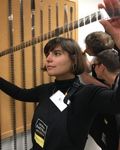2023
Mal Ahern
- Assistant Professor
- University of Washington

Abstract
“Factory Forms” is a materialist history of image reproduction in the postwar United States. It examines the wave of industrial automation that transformed the work of printing, film processing, projection, and television broadcast in the decades after WWII, when media executives hoped that automated presses and projectors would increase the volume and velocity of image reproduction by curbing the need for skilled labor. As new technologies displaced long-established craft techniques for securing image quality, a burst of visible errors appeared in print and on screens. Misprints and distortions revealed the image’s formal infrastructure in disjointed layers, swarms of dots, and hallucinogenic flicker. These patterns then resurfaced as formal motifs in fine art and popular design, illustrating the era’s technological changes and labor conflicts. While many critics argue that postwar artists embraced mechanical reproduction in order to destroy traditional ideals of art’s uniqueness, “Factory Forms” proposes we invert this formula: by incorporating repetitive and automated procedures, artists and designers revealed the differences that persist among mass-produced images of all kinds. Drawing equally on close looking and technological history, “Factory Forms” reads images for signs of industrial crisis.

